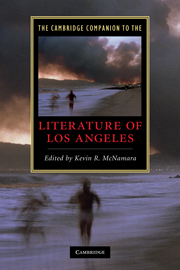Book contents
- Frontmatter
- Introduction: landmarks
- 1 The literature of the Californios
- 2 The Anglo invention of Los Angeles
- 3 LA fiction through mid-century
- 4 British expatriates and German exiles in 1930s-1940s Los Angeles
- 5 Postwar Los Angeles: suburban Eden and the fall into history
- 6 Los Angeles and the African-American literary imagination
- 7 Pacific Rim city: Asian-American and Latino literature
- 8 The literature of urban rebellion
- 9 City of sleuths
- 10 Los Angeles’ science fiction futures
- 11 Hollywood fictions
- 12 The Southland on screen
- 13 Scenes and movements in Southern California poetry
- 14 Surf, sagebrush, and cement rivers: Reimagining nature in Los Angeles
- 15 Essaying Los Angeles
- Guide to further reading
- Index
2 - The Anglo invention of Los Angeles
Published online by Cambridge University Press: 28 May 2010
- Frontmatter
- Introduction: landmarks
- 1 The literature of the Californios
- 2 The Anglo invention of Los Angeles
- 3 LA fiction through mid-century
- 4 British expatriates and German exiles in 1930s-1940s Los Angeles
- 5 Postwar Los Angeles: suburban Eden and the fall into history
- 6 Los Angeles and the African-American literary imagination
- 7 Pacific Rim city: Asian-American and Latino literature
- 8 The literature of urban rebellion
- 9 City of sleuths
- 10 Los Angeles’ science fiction futures
- 11 Hollywood fictions
- 12 The Southland on screen
- 13 Scenes and movements in Southern California poetry
- 14 Surf, sagebrush, and cement rivers: Reimagining nature in Los Angeles
- 15 Essaying Los Angeles
- Guide to further reading
- Index
Summary
From California's entrance into the Union in 1850 until the end of World War I, speakers of English - “Anglos” in California usage, regardless of ethnic ancestry - generated a large, though now mostly forgotten, popular literature in and around Los Angeles. What is of interest in the literary history of this otherwise ignored era is not the few works that rise above mediocrity, but the fact that almost all of these fictions merge imperceptibly with travel writing to constitute a literature of place, obsessed with analyzing, publicizing, and critiquing both the found and the constructed landscape. “Place” is the thesis of LA literature in the era that saw Anglos move from frontiersmen to bourgeoisie; the fictions they wrote and read are largely a pretext for appropriating Los Angeles to their own historical imperatives and cultural needs. A definition of “Los Angeles”: at the beginning of the period, it is synonymous with all of Southern California, or at least the region comprising today's counties of Ventura, Los Angeles, San Bernardino, Orange, and Riverside. Furthermore, the Mojave Desert presses upon Los Angeles' literary consciousness. Paradoxically, the dimensions of “Los Angeles” contract as the old pueblo itself becomes sufficiently populated to merit attention. At certain points other communities claim their own share of attention and become venues for subsets of the literary production of the period, especially the independent health-and-pleasure resort towns like Pasadena.
- Type
- Chapter
- Information
- The Cambridge Companion to the Literature of Los Angeles , pp. 23 - 34Publisher: Cambridge University PressPrint publication year: 2010



